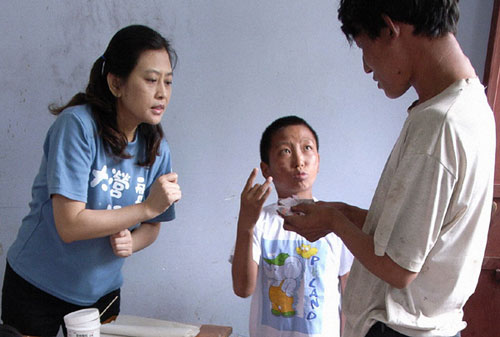Help for shunned village
Updated: 2011-03-01 07:56
By Cheng Yingqi (China Daily)
|
|||||||||||
 |
|
Zhang Pingyi, a journalist-turned-volunteer from Taiwan, talks to children in a leprosy-plagued village in the Liangshan Yi autonomous prefecture, Sichuan province, in this file photo. Provided to China Daily |
BEIJING - Zhang Pingyi never expected that a trip to a remote village in Sichuan province would change the course of her life.
In 1999, Zhang, then a journalist in Taiwan, was curious about a village in Zhaojue in the Liangshan Yi autonomous prefecture.
It was set up by the government in 1959 as a means of disease control to house patients suffering from the then deadly and contagious disease of leprosy.
| ||||
"Time stood still in the village," Zhang recalled about her first visit. "More than 200 people in the village lived without water or electricity. They still used a flint to start a fire."
In fact, Zhang said, when villagers heard the horn of her approaching car they didn't even know what it was.
Zhaojue's residents have survived for three generations in the village built on a cliff.
The village is now home to 165 patients and 110 of their family members, most of them illiterate and discriminated against by nearby villagers.
The village is located in a region where the majority of residents belong to the ethnic Yi group, who traditionally believe leprosy signals being possessed by ghosts. They have been known to burn patients to death or throw them in the river.
If untreated, the chronic disease caused by bacteria can cause permanent damage to the skin, nerves, limbs and eyes, so sufferers' fingers and toes become shortened and deformed as the cartilage is absorbed into the body.
Many leper colonies remain around the world in countries including India, China and Japan.
In 1999, when Taiwan was planning to close its last leper sanatorium, Zhang became interested in the situation of leper colonies on the Chinese mainland.
With the help of a priest, who cared for leper patients on the Chinese mainland in the 1950s, Zhang found more than 20 leper colonies in Sichuan, Yunnan and Guangdong provinces.
She chose to visit Zhaojue.
"The first day I set foot in the village I swore I wouldn't return to this terrible place even if someone put a knife to my throat," said Zhang, who grew up in an affluent family in Taiwan.
She couldn't even find a toilet in the village. Children were so dirty, "sometimes the only recognizable feature on their faces were their blinking eyes."
However, the image of those simple children returned to her mind again and again - especially their lonely glances and wide-eyed expressions at the second-hand toys Zhang brought along.
"I didn't expect that more than 50 percent of the people in the leper colonies would be healthy young people," she said. "As a mother of two children myself, I couldn't help wondering about their futures."
Zhang was even more disappointed when she saw the dilapidated school had only one substitute teacher, and no one had graduated because he was not capable of teaching lessons in the fifth grade or above.
The teacher, Wang Wenfu, was also about to leave because his 164-yuan ($25) monthly income was only one-fifth that of teachers in other schools.
"When all the teachers of the county had dinner together, no one would sit at my table," Wang said.
Zhang persuaded Wang to stay, promising to get money for the school.
Returning to Taiwan, Zhang quit her 12-year journalism career and established a foundation for children in the leper colonies.
"I only wish I were a super rich person," Zhang said, recalling her hard years of fundraising.
She subsequently raised money to build a new school providing nine-year compulsory education for the village.
As no more teachers were willing to teach at the school, Zhang hired volunteers from Taiwan and abroad.
She settled herself in the school, bought the students toothbrushes and taught them to brush their teeth regularly.
She also found time to write two books on her observations in the leper colonies.
In return, she donated all the money she made from the books to the school, sponsoring a tap-water system and a dining hall.
In 2005, the first group of 16 students graduated from the school, which now has 300 students and 10 teachers.
As more students continued to finish their middle school education, Zhang started to consider their job opportunities.
She said she "forced" her brother, who runs a plant in Qingdao, Shandong province, to take graduates from the village and train them into skilled workers.
Now some of the graduates earn 4,000 yuan a month at the plant.















